Ministry of Defence
India has become a voice of balance & responsibility in the current global environment; Indo-Pacific & Global South nations view India as a reliable partner: Raksha Mantri at Chanakya Defence Dialogue
“Our Armed Forces are a driving force that allows India to deal with its neighbourhood challenges while contributing to regional stability”
“India believes in peace and dialogue, but when it comes to the sovereignty & security of the people, we do not compromise”
“Sashakt, Surakshit and Viksit Bharat goal aimed at building a nation that strengthens global peace & human well-being”
Posted On:
28 NOV 2025 1:08PM by PIB Delhi
“India’s economic growth, technological capabilities and principled foreign policy have made it a voice of balance & responsibility in the changing global environment, with countries across the Indo-Pacific and the Global South viewing us as a reliable partner,” said Raksha Mantri Shri Rajnath Singh at the Chanakya Defence Dialogue organised on the theme ‘Reform to Transform - Sashakt, Surakshit aur Viksit Bharat’, in New Delhi on November 28, 2025. He asserted that India is shaping global discussions of today with a sense of responsibility, strategic autonomy & confidence rooted in civilisational values, and the global trust it has earned is due to the path-breaking reforms, and its consistent stand for respect of sovereignty of nations and rules-based order.
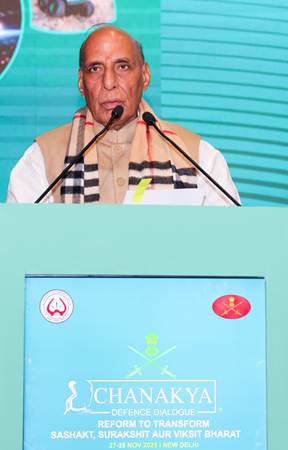
Raksha Mantri emphasised that the geopolitical uncertainty and challenges such as terrorism, cross-border support to extremist elements, attempts to alter the status quo, maritime pressures, and even information warfare require constant vigilance & clarity of purpose, with reforms becoming a strategic necessity more than a choice. Reforms strengthen the adaptability of institutions, enhance the agility of the Armed Forces, and give the nation the confidence to shape its own destiny, he said, while enumerating the steps taken by Prime Minister Shri Narendra Modi-led Government to build a Sashakt, Surakshit and Viksit Bharat.
“We are strengthening border and maritime infrastructure to support security & connectivity. We are modernising our forces through new platforms, technologies, and structures. We are reforming procurement processes to ensure speed, transparency and accountability. Through Aatmanirbharta, we are building a defence industrial ecosystem that encourages innovation, supports industry, and reduces external dependencies. We are investing in start-ups, deep-tech capabilities, and R&D that will shape the battlefields of the future. We are ensuring that the interests and welfare of our soldiers, veterans and their families remain central to our decision-making,” stated Shri Rajnath Singh.
Advocating that resilience is as important as capability, Raksha Mantri stated that a resilient India can absorb shocks, adapt quickly, and continue moving forward irrespective of the circumstances. He described the Armed Forces as the strongest pillar of the nation’s resilience, stressing that their capability, readiness, restraint and firmness is a driving force that allows India to deal with its neighbourhood challenges while contributing to regional stability. “India believes in peace and dialogue, but when it comes to the sovereignty & security of the people, we do not compromise”, he said.
Shri Rajnath Singh added that the contribution of the Armed Forces goes far beyond defending the borders. “Our Armed Forces bring stability where it is needed most. They support civil authorities in times of disaster. They safeguard our maritime interests. They strengthen our international partnerships through joint exercises and peacekeeping. Their professionalism builds confidence - not only within India, but also among our friends around the world. That’s why reform and modernisation in the Armed Forces are not just administrative tasks; they are investments in India’s long-term future,” he said.
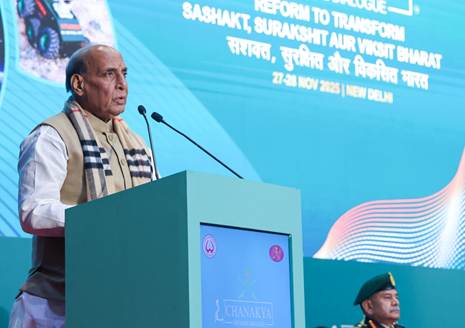
Raksha Mantri also underlined that the reforms undertaken by the Government are not isolated actions, but are helping to create a nation that strengthens global peace and human well-being. “When India advances on the path of strength, security and development, the world benefits in several ways: First, a stable India contributes to a stable global economy. Second, India’s digital public infrastructure offers a model of inclusive, transparent and secure governance for many nations. Third, India’s ethical approach to emerging technologies - whether AI, cyber or space - sets standards that others look to. Fourth, our commitment to peace, climate responsibility and humanitarian values adds moral weight to international cooperation,” he said.
As part of the event, Shri Rajnath Singh launched key Digitalisation and Green initiatives:
EKAM: AI as a Service - iDEX ADITI 2.0
Project Ekam is a strategic initiative to develop indigenous Artificial Intelligence (Al) solutions for the Armed Forces. The main highlight of this project lies in its ability to provide complete control over data security, tailored solutions to military terminology, operational doctrines and specific data sets. The project has developed the framework and platform for deployment and hosting of all open-source and indigenous AI models running on state-of-the-art Al applications and thus will be a game-changer for the defence forces.
Prakshepan
Prakshepan is a cutting edge Military Climatology Application for Indian Army developed in-house by Directorate General of Information Systems. It has been powered by scientific & technical collaboration from several ministries with agencies like India Meteorological Department, National Centre for Medium Range Weather Forecasting, Central Water Commission, North East Space Application Centre, Geological Survey of India and Defence Geospatial Research Organisation.
It has three prediction modules, viz Landslide Prediction, Flood Prediction and Avalanche Prediction. Beyond military applications, it will also be able to provide early warnings to civil administration in remote areas, contributing to national disaster resilience and capacity building.
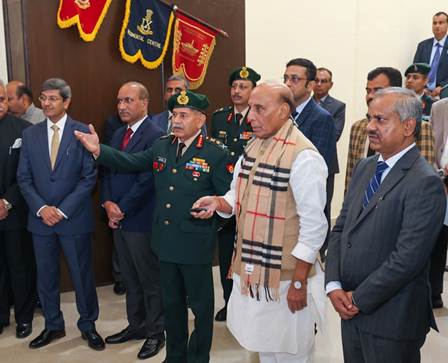
AI Handbook for Military Leaders
The handbook is a direct response to the imperative to equip military leaders from tactical to strategic levels with the foundational knowledge necessary to navigate this new era. It is designed specifically for military leaders who are decision-makers, providing them with a cognitive map to leverage Al’s potential in Command, Control, Coordination, Communication, Combat Systems, Intelligence, Surveillance, and Reconnaissance, and autonomous platforms, while grounding their decisions in strategic reality.
The Book: Digitalisation 3.0 - From Boots to Bytes & Towards Al Readiness
Digitalisation 3.0 captures Indian Army’s transformation as it advances from traditional systems to a technologically empowered force through 100 applications, reflecting its commitment to indigenisation, innovation and Aatmanirbhar Bharat. The book is built around two key themes - Digital Sena From Books to Bytes and Towards Al Ready Indian Army.
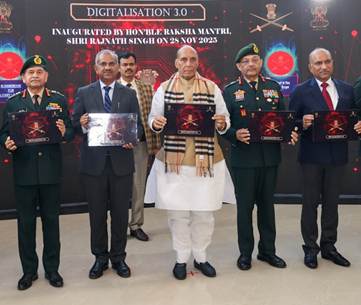
E-inauguration of Green Hydrogen Microgrid Project
National Thermal Power Corporation has set up the Green Hydrogen Microgrid Project for the Indian Army at an elevation of 4,500m Mean Sea Level in Chushul, Ladakh. The objective is to replace fossil fuel DG sets from Army Establishments which are not connected to the Grid and reduce carbon emissions of 1500 Tonnes per annum among others.
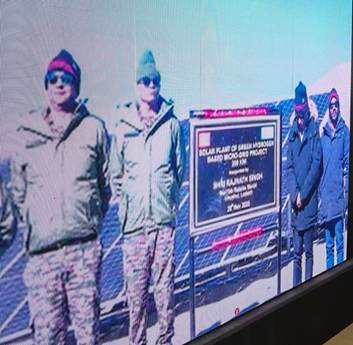
Chief of the Army Staff General Upendra Dwivedi, Secretary (Defence Production) Shri Sanjeev Kumar, Secretary, Ministry of Earth Sciences Dr M Ravichandran, DG Centre for Land Warfare Studies (CLAWS) Lieutenant General Dushyant Singh (Retd), Chairman NTPC Shri Gurdeep Singh, attaches from foreign services, representatives of the diplomatic community, scholars from think-tanks & academia and civil and military officials were present on the occasion.
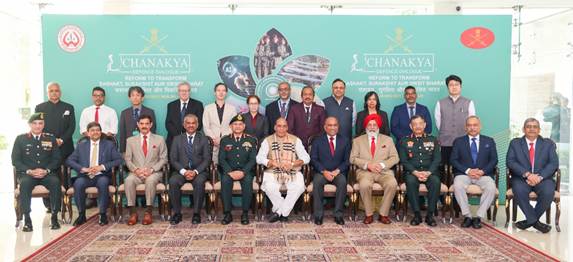
The Chanakya Defence Dialogue 2025, organised by the Indian Army, in collaboration with CLAWS, has brought together military leaders, global strategic experts, diplomats, industry leaders and young scholars to examine India’s security challenges and technological frontiers in an increasingly contested global landscape. The two-day event, which commenced on November 27, 2025, aims to create a comprehensive platform for strategic deliberation on India’s future security architecture.
***
VK/NA/Savvy
(Release ID: 2195762)
Visitor Counter : 1781